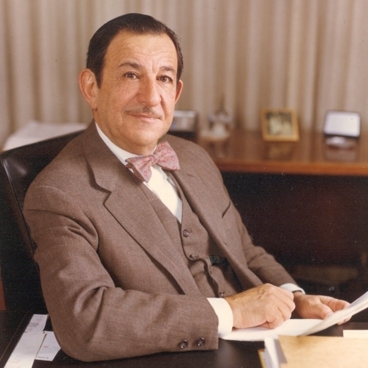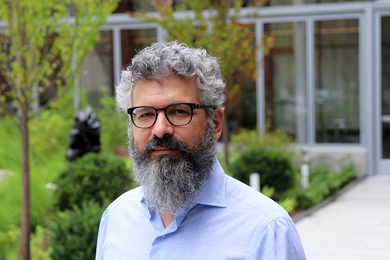Professor Emeritus Eli Shapiro, the bow-tie-bedecked economist who helped to develop the MIT Sloan School of Management’s academic character, died Saturday, Dec. 4, after a short illness. He was 94.
Shapiro was professor of finance at MIT Sloan from 1952 until 1962, before leaving to teach at Harvard Business School. He returned to MIT Sloan in 1976 as the Alfred P. Sloan Professor of Management, a position he held until his retirement in 1984.
MIT Sloan’s first associate dean, Shapiro was known for his finance-appropriate dictum “Don’t forget the cash!” In addition to his work at MIT and Harvard, he taught at the University of Chicago, chaired the finance committee of the board of directors of Travelers Insurance Companies, and was president of the National Bureau of Economic Research from 1982 until 1984.
Shapiro arrived at MIT Sloan just as it was being established as a new school of management (it had previously been known as Course XV at MIT). He would become the school’s first associate dean, as well as chairman of the Sloan Fellows executive education program.
“Professor Shapiro had an extraordinarily distinguished career,” said John C. Head III Dean David Schmittlein. “More than anyone, he was instrumental in charting the future academic direction of the school in the 1950s.”
Trained in finance, Shapiro took to the culture and plurality of MIT, seeking out competitive advantage for the management school in the halls of the Institute.
“When I came to the school, it was my view that management education was a synthetic product, the application of various disciplines to the management of an enterprise,” Shapiro said in a 2000 interview. “You build a faculty by taking people from various disciplines who have an interest in applying those disciplines to solve management problems. MIT was science and engineering, so that’s where we turned.”
“In the 21st century, most of the big issues of industry are technological,” Shapiro said. “The more technical management becomes, the greater Sloan has an advantage by being part of MIT.”
Shapiro was also known for his devotion to bow ties. Students in one of his last Program for Senior Executive sessions surprised the retiring professor by wearing bow ties in his honor and leaving the neckwear on his desk at the end of class.
Shapiro is survived by his daughter, Laura Dowling, her husband, Neal Dowling, and granddaughters, Julia and Sarah Dowling, all of Sudbury, Mass. Burial will be private. A memorial service is planned for the spring. Donations to the Dana-Farber Cancer Institute, 44 Binney St., Boston, MA, 02115, are requested in lieu of flowers.
Shapiro was professor of finance at MIT Sloan from 1952 until 1962, before leaving to teach at Harvard Business School. He returned to MIT Sloan in 1976 as the Alfred P. Sloan Professor of Management, a position he held until his retirement in 1984.
MIT Sloan’s first associate dean, Shapiro was known for his finance-appropriate dictum “Don’t forget the cash!” In addition to his work at MIT and Harvard, he taught at the University of Chicago, chaired the finance committee of the board of directors of Travelers Insurance Companies, and was president of the National Bureau of Economic Research from 1982 until 1984.
Shapiro arrived at MIT Sloan just as it was being established as a new school of management (it had previously been known as Course XV at MIT). He would become the school’s first associate dean, as well as chairman of the Sloan Fellows executive education program.
“Professor Shapiro had an extraordinarily distinguished career,” said John C. Head III Dean David Schmittlein. “More than anyone, he was instrumental in charting the future academic direction of the school in the 1950s.”
Trained in finance, Shapiro took to the culture and plurality of MIT, seeking out competitive advantage for the management school in the halls of the Institute.
“When I came to the school, it was my view that management education was a synthetic product, the application of various disciplines to the management of an enterprise,” Shapiro said in a 2000 interview. “You build a faculty by taking people from various disciplines who have an interest in applying those disciplines to solve management problems. MIT was science and engineering, so that’s where we turned.”
“In the 21st century, most of the big issues of industry are technological,” Shapiro said. “The more technical management becomes, the greater Sloan has an advantage by being part of MIT.”
Shapiro was also known for his devotion to bow ties. Students in one of his last Program for Senior Executive sessions surprised the retiring professor by wearing bow ties in his honor and leaving the neckwear on his desk at the end of class.
Shapiro is survived by his daughter, Laura Dowling, her husband, Neal Dowling, and granddaughters, Julia and Sarah Dowling, all of Sudbury, Mass. Burial will be private. A memorial service is planned for the spring. Donations to the Dana-Farber Cancer Institute, 44 Binney St., Boston, MA, 02115, are requested in lieu of flowers.






